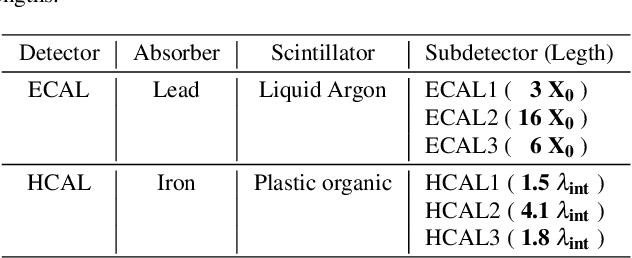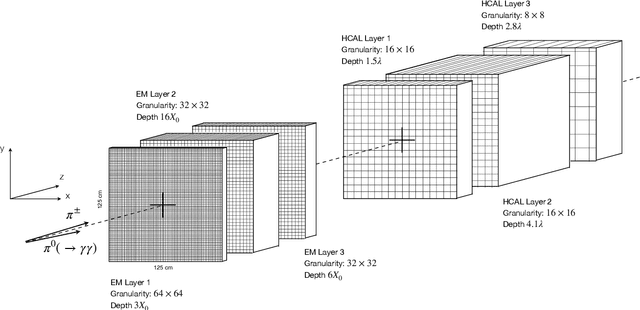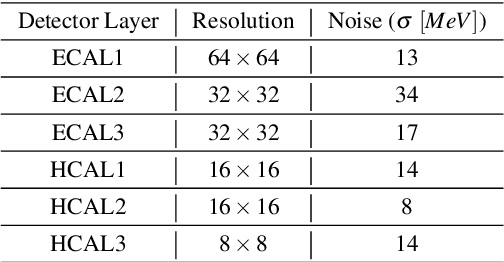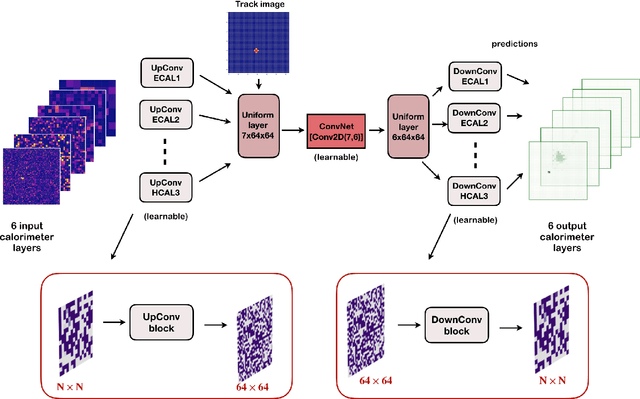Francesco Armando Di Bello
Fast Neural Network Inference on FPGAs for Triggering on Long-Lived Particles at Colliders
Jul 11, 2023Abstract:Experimental particle physics demands a sophisticated trigger and acquisition system capable to efficiently retain the collisions of interest for further investigation. Heterogeneous computing with the employment of FPGA cards may emerge as a trending technology for the triggering strategy of the upcoming high-luminosity program of the Large Hadron Collider at CERN. In this context, we present two machine-learning algorithms for selecting events where neutral long-lived particles decay within the detector volume studying their accuracy and inference time when accelerated on commercially available Xilinx FPGA accelerator cards. The inference time is also confronted with a CPU- and GPU-based hardware setup. The proposed new algorithms are proven efficient for the considered benchmark physics scenario and their accuracy is found to not degrade when accelerated on the FPGA cards. The results indicate that all tested architectures fit within the latency requirements of a second-level trigger farm and that exploiting accelerator technologies for real-time processing of particle-physics collisions is a promising research field that deserves additional investigations, in particular with machine-learning models with a large number of trainable parameters.
Configurable calorimeter simulation for AI applications
Mar 08, 2023Abstract:A configurable calorimeter simulation for AI (COCOA) applications is presented, based on the Geant4 toolkit and interfaced with the Pythia event generator. This open-source project is aimed to support the development of machine learning algorithms in high energy physics that rely on realistic particle shower descriptions, such as reconstruction, fast simulation, and low-level analysis. Specifications such as the granularity and material of its nearly hermetic geometry are user-configurable. The tool is supplemented with simple event processing including topological clustering, jet algorithms, and a nearest-neighbors graph construction. Formatting is also provided to visualise events using the Phoenix event display software.
Towards a Computer Vision Particle Flow
Mar 19, 2020



Abstract:In high energy physics experiments Particle Flow (PFlow) algorithms are designed to reach optimal calorimeter reconstruction and jet energy resolution. A computer vision approach to PFlow reconstruction using deep Neural Network techniques based on Convolutional layers (cPFlow) is proposed. The algorithm is trained to learn, from calorimeter and charged particle track images, to distinguish the calorimeter energy deposits from neutral and charged particles in a non-trivial context, where the energy originated by a $\pi^{+}$ and a $\pi^{0}$ is overlapping within calorimeter clusters. The performance of the cPFlow and a traditional parametrized PFlow (pPFlow) algorithm are compared. The cPFlow provides a precise reconstruction of the neutral and charged energy in the calorimeter and therefore outperform more traditional pPFlow algorithm both, in energy response and position resolution.
 Add to Chrome
Add to Chrome Add to Firefox
Add to Firefox Add to Edge
Add to Edge